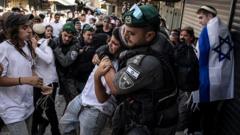The annual Jerusalem Day celebrations turned violent as far-right activists confronted Palestinians with chants of hatred, leading to clashes in the Old City. Prominent figures condemned the event, highlighting the ongoing tensions surrounding Israeli sovereignty and the rights of Palestinians.
Jerusalem Day Parade Marred by Violence Against Palestinians

Jerusalem Day Parade Marred by Violence Against Palestinians
Far-right Israeli marchers clashed with Palestinians during the annual Jerusalem Day parade, invoking nationalistic chants and aggression.
Crowds of far-right Israelis erupted in anti-Palestinian violence during the annual Jerusalem Day parade, marking a troubling escalation in tensions. This year's event, occurring amid ongoing military operations in Gaza, saw marchers chant fiercely aggressive slogans such as "death to Arabs" and "Your home will be ours," echoing sentiments of nationalism and exclusion.
Israeli police were present in significant numbers as ultranationalist Jews flooded the Damascus Gate area of the Old City, celebrating what they regard as the unification of Jerusalem following the 1967 war that resulted in the annexation of East Jerusalem. Opposition leaders, including Yair Lapid, condemned the event, labeling it a disgrace to Judaism and a festival of "hatred and racism."
Witnesses reported harassment of local Arab traders as tensions rose. Activists displayed provocative banners proclaiming, "67 - Jerusalem in our hands; 2025 - Gaza in our hands," further fueling hostility. National security minister, Itamar Ben Gvir, echoed inflammatory rhetoric, advocating for severe actions against "terrorists" while visiting the contentious Al-Aqsa mosque compound, a site of deep religious significance.
Condemnations poured in from Palestinian officials, criticizing the escalation of violence and the provocations exemplified by the march. Nabil Abu Rudeineh, a spokesman for the Palestinian presidency, warned that such acts jeopardize regional stability. Israeli Prime Minister Benjamin Netanyahu, in a cabinet meeting, reinforced his administration's commitment to maintaining a united Jerusalem under Israeli control.
Visuals of the violence present a stark portrayal of the animosity present within the city, prompting reactions from opposition leaders. Yair Golan drew attention to the dehumanizing conduct witnessed, stating, "This is what hatred, racism, and bullying look like." These sentiments underscore a growing divide, with calls for a Jerusalem that belongs to all faiths, contrary to the exclusivity displayed during the parade.
As the war in Gaza looms large, with over 53,939 casualties reported, including many civilians, this year's Jerusalem Day served as a painful reminder of ongoing conflicts surrounding the contested city and Palestinian rights. The march, which caught worldwide attention, reflected a broader struggle that continues to resonate deeply across both Israeli and Palestinian communities.





















